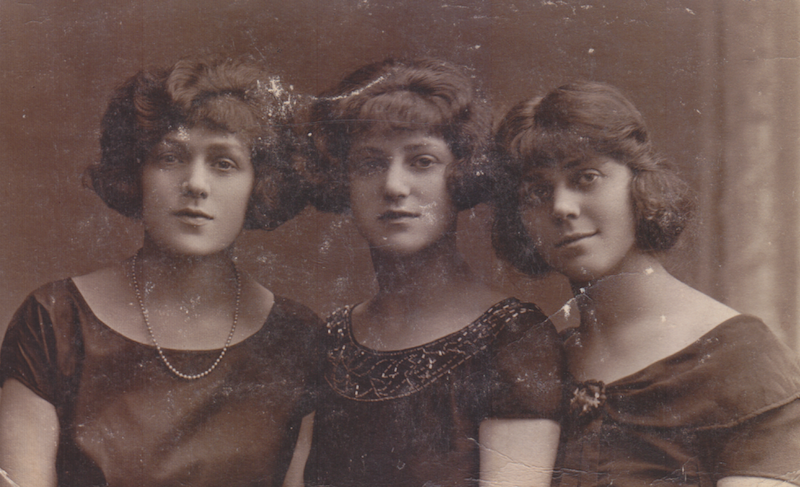 My grandmother Amelia (Millie) Harris was born on January 23, 1906 at City of London Lying-In Hospital at 228 Old Street, the daughter of Russian immigrants.
My grandmother Amelia (Millie) Harris was born on January 23, 1906 at City of London Lying-In Hospital at 228 Old Street, the daughter of Russian immigrants.
From Vilna and Riga to London
Her father, my great-grandfather Meir Shapiro, left Vilna in Lithuania and arrived in England in about 1903, and was followed two years later by his wife, Rivka (nee Jankelson, from Riga, Latvia) who came with their two daughters, Rose and Rachel (Ray.) Another sister, Gittel or Gertie, died en route to England.
My grandmother Amelia was born after her parents reunited; another London-born child, her younger brother David, died of the measles at the age of six months. A week after his death, my grandmother fell into an open fire, almost losing her sight, and her mother, saying “this house is evil,” demanded that they move from their home at 28 Hare Street, Bethnal Green.
The Hoxton seaside
Their new home was at 89 Bridport Place, Hoxton. Though Hoxton today is a gentrified mélange of art galleries, bars and chic boutiques, it was far from that in my grandmother’s day.
Homes were overcrowded—one house could accommodate five families—while prostitution and crime were common. Its one saving grace, my grandmother said, was a canal at the end of their road that her mother’s friends called “the seaside.”
A queenly storyteller
I know these stories because my grandmother told them to me many, many times over the course of her long life. She was the most marvellous storyteller I have ever known. She never wrote her stories down—she simply declaimed them, with the drama and flourish of a queen (her Hebrew name, Malka, or queen, fit her perfectly.)
Fortunately I had recorded many of her tales in the summer of 1993, a decade before she died on January 17, 2004 – her 98th birthday, according to the Hebrew lunar calendar.
Anti 'alien' sentiment
My Shapiro great-grandparents were fortunate enough to arrive in England before the passage of the 1905 Aliens Act, which restricted immigration. Anti-immigrant sentiment, then as now, was rife: in 1904, the Daily News decried “these unwashed, cringing, lying and wage-cutting aliens, who have elbowed thousands of Englishmen out of their homes and out of their employment.”
Even so, my great-grandparents proved resourceful. In Hoxton, the family opened a shop that sold old boots, rubber soles and heels, leather, gaiters, knives, nails, tin tacks and screws, and they lived behind it in a room called a shop parlour.
Scholarships and boot polish
But they were so poor that my grandmother had to leave school in 1920, at the age of 14, as she told me:
“I had already won two scholarships but my mother couldn’t afford the uniform. She said, ‘You don’t need it. You’ll get married, what do you want all that for?’ But it would have been lovely to have had a good education. I left at 14 and there was no work to be found at all.
In the end, my mother put a big box of Cherry Blossom boot polish—little tins—and she said, ‘Go in the market and sell the polish. You’re good, you can talk, you can sell anything.’ So I went to the market. I stood in the street, and I held out my hands, with two tins of polish, like a peddler, shouting out, “Two for tuppence ha’penny!” In the end, I sold 144 tins of boot polish.
I went home with my pockets laden, and my mother and father were so thrilled. And the next day, my mother said, “Go again. You’ll sell another.”
Too insolent
My grandmother peddled boot polish for three months, at which point my great-grandmother consulted "The Ladies", most likely the Ladies’ Conjoint Visiting Committee established in 1884 by the Jewish Board of Guardians, which provided advice and financial assistance to poor Jews.
With their assistance, my grandmother began an apprenticeship at a court dressmakers in Sloane Square for a salary of six shillings a week. But the job didn’t last long.
“So I had this job,” my grandmother said, laughing, “that I hated. The shop was beautiful, court dress making, royalty used to come there, beautifully crafted, lovely sofas and easy chairs. But the back was like Dickens.
The floor was wooden boards, wooden stools to sit on, lit by gas jets, and [the forewoman] constantly sent me for errands, ‘get me a pint of milk, get me a loaf of bread, pick up the pins.’ I had to scrabble about on the bare boards, all in the creases of the boards, the pins, [and she would say] ‘there’s plenty of pins there that you haven’t picked up.’
I said 'I’ve come to learn the trade, but I’m not learning anything.' Anyway, after a week, she said, ‘I’m not keeping you. You’re too insolent.’"
Sixteen shillings a week
After my outspoken grandmother lost her first job, her mother told her to look for another, saying that she was now an 'improver' with experience to her name. So, my grandmother said,
“I had to do as I was told. We never disobeyed our parents. I went to the West End, and I saw a ticket in a big window, “Improvers For Dress-Making Wanted.”
So I went in, and the forelady said to me, ‘Where have you been working before?’ I said, ‘Oh, in Sloane Square, court dress-making.’ ‘You have?’ ‘Yes, I have.’ She said, ‘When would you like to start?’ So I said, ‘You mean I’ve got the job?’ ‘Yes,’ she said. ‘You can start on Monday at sixteen shillings a week.’ A fortune! Sixteen shillings a week.”
My grandmother spent many years as a seamstress, working her way up to 'first-hand' (making the garment from start to finish) and then as a cutter and designer.
In 1929, the year in which both she and her older sister Ray got married (within eleven weeks of each other) she sewed her sister’s wedding gown; her sister Ray, who was also a dressmaker, sewed my grandmother’s wedding dress.
The woman from the Pru
During the Second World War, my grandmother found a coveted job as an insurance agent with the Prudential—a job that before the war would have been reserved for men, my mother Irene Glausiusz notes. “Previously they did not employ women agents, but with the call-up of the men, they had to change the rules,” she says.
For a weekly fee, paid in cash, the company paid out sickness and unemployment benefits, and my grandmother collected the subscriptions and paid out benefits.
“I used to trail about in all weathers, paying sick money,” my grandmother said. “The National Health [Service] hadn’t started yet. It started in 1948. And if somebody was sick, all they got was nine shillings a week.”
She added, “I liked it very much. Very much indeed. I liked meeting people. They were full of humour. Nobody had a bell or a knocker; there was always a hole in the door with a piece of string, and you pulled the string and you went in and they used to say, “Come in, cock.” Anyway, I sold more policies than an experienced agent."
My mother Irene confirms this: “Grandma was good at the job and I do remember the huge ledgers in which all the details were written. She was always good with figures.” But, she added, “When the war finished, they said, ‘well, tough, we have to give the jobs back to the men.’”
Indeed, the Prudential’s own timeline of history proudly notes that in 1949, “The 'Man from the Pru' a household phrase since the turn of the century, was launched as an advertising image to re-establish the identity of the agent in the post-war world.”
The Sussex seaside
My grandmother weathered this setback and many others. Following World War II, she started her own dressmaking business with my grandfather in Virginia Road, Bethnal Green, which they ran until 1965. In that year they left London to buy a home in Hove on the Sussex coast, which for many years my grandparents ran as a boarding house.
Resilience and resourcefulness
My grandmother was a living testimony to the resilience and resourcefulness of immigrants and the children of immigrants.
In her nearly century long life she lived through two world wars, the Depression, the introduction of indoor plumbing, the creation of the National Health Service, the invention of television and nuclear bombs and much else besides. She survived breast cancer and many illnesses of old age for which she received excellent care from the NHS.
Throughout her life she was strong, almost indomitable; outspoken, independent, stubborn, warm, loving, and a lover of life, invariably friendly and gregarious, and with an impressive command of the English language. When she spoke, people listened. So did I.
A huge thank you to Josie Glausiusz for contributing this story and wonderful photograph to the East End Women's Museum.





